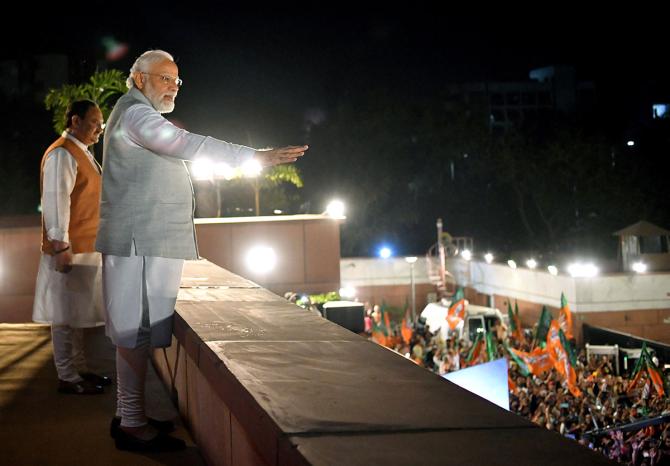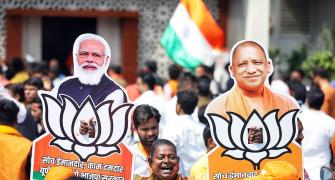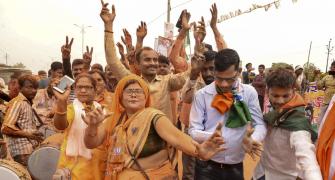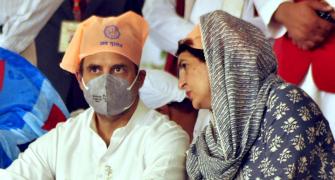'Modi looks to be an effective, result-oriented, purposeful leader, focused on bringing greatness and glory to the nation.'
'So it is best for his critics to give up their sniping and supplement his efforts,' asserts B S Raghavan, the distinguished civil servant who served three prime ministers.

Unstatutory warning: This article is firmly not for a nuts-and-bolts analysis of the elections to Goa, Manipur, Uttarakhand, Punjab and Uttar Pradesh legislative assemblies.
All the different features of those elections -- voter turnout, voting shares, caste and community implications, the number of seats won and lost, the heads that rolled, the political calculus, the whys and wherefores governing it all -- would by now be filling column inches of the print media and repetitively drummed into the ears of those choosing to watch the electronic media.
Habitual columnists and commentators and spokespersons of the various parties would be exhausting themselves trotting out their trade-mark versions in language and phraseology that have little changed over time. Hence, it would be cruel on my part to pretentiously inflict my version, based not on any inside knowledge or new data, but solely on speculation and presumptions derived from my dotty handling of public affairs in the past and disjointed observation of events and happenings in the present.
I will spare the readers all that trouble and focus only on a few perspectives which I consider important for their long-term impact on the country's future.
The first is the slow but sure spreading of the appeal of the Bharatiya Janata Party to parts of the country where its presence was either tenuous or non-existent.
The BJP's claims of victory in a number of wards in the recent elections to local bodies in Tamil Nadu were greeted with derisive laughter, but the fact of its emergence at the grassroots, though at places few and far between as of now, in a state which hitherto was an impregnable stronghold of Dravidian parties, alienated from India's cultural mainstream, should not be brushed aside.
Reading the tea leaves, it would seem that the people at large have begun viewing the BJP as a credible national party in the place of the Indian National Congress (INC), whose role as a party which won India's freedom under great leaders noted for their simplicity, integrity and sacrifice, has ceased to have any relevance or charm.
More and more, the INC is seen as a clueless cluster of wandering nomads mouthing shibboleths like secularism and on the lookout for a safe refuge.
Gandhi foresaw this almost on the first day of Independence and urged its being wound up. Like his advice on all other matters such as putting the viceroy's and governors's mansions to use for hospitals and educational institutions and ministers being exemplars of service before self, this advice also was ignored to the nation's cost.
It is not that the BJP is pure as pristine snow, but it has infused the nation with a spirit of self-confidence and pride in asserting its identification with India's culture and civilisation. Its record of implementation of all the people-friendly schemes it had announced is very good.
In other words, in its case announcements have not been a substitute for accomplishments, as in the case of governments in this country.
At the level of governance, it is impressing the common people as a party working hard to ameliorate the woeful conditions in which they live. It has managed the post-pandemic situation better than even advanced countries with no serious damage to the economy.
On the contrary, indications are that India will have a 9 per cent growth in 2022-2023, with further hopeful prospects ahead. The massive capex on infrastructure provided for in the current year's Budget and other imaginative measures are bound to achieve the intended goals of atmanirbharta and ease of living and doing business.
There is, no doubt, an uneasiness about inequalities and disparities, and the rich becoming richer and the poor poorer. There is also, to my mind, wanton bad mouthing of the government's approach to human rights and civil liberties.
The government needs to come out with a white paper on all the measures it has taken and is taking to meet the criticism, relating the outlays with the outcomes. Deficiency in communication is often root cause of the criticism born out of ignorance.
In my opinion, these elections should also be looked at from the perspective of being a curtain-raiser for the Lok Sabha election of 2024. I have no doubt that the BJP performing a hat-trick in 2024 with an increased majority is a foregone conclusion.
There is a good chance of its winning a noticeable number of Lok Sabha seats in Tamil Nadu and making history if it boldly goes it alone as it did during the local body elections.
To all who have met him on the national and international stage, Prime Minister Narendra Damodardas Modi looks to be an effective, result-oriented, purposeful leader, focused on bringing greatness and glory to the nation, and they cannot all be wrong.
So it is best for his critics to give up their small-minded sniping and supplement his efforts in a mood of constructive criticism and cooperative federalism.
B S Raghavan is a retired member of the Indian Administrative Service who held senior positions in the ministry of home affairs during the administrations of then prime ministers Jawaharlal Nehru, Lal Bahadur Shastri and Indira Gandhi.









